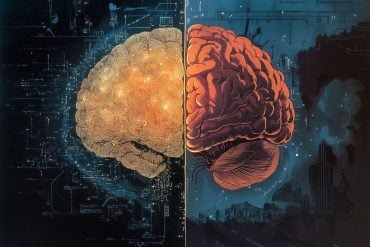Summary: According to new research, people unconsciously mimic others’ prudent, lazy or impatient attitudes.
Source: PLOS.
People tend to unconsciously imitate others’ prudent, impatient or lazy attitudes, according to a study published in PLOS Computational Biology.
“Prudence”, “impatience” or “laziness” are typically thought of as entrenched personality traits that guide how people weigh the cost of risk, delay and effort (respectively). However, new research shows that people’s attitudes towards effort, delay, or risk drift towards those of others.
Jean Daunizeau and Marie Devaine, from INSERM, Paris, combined mathematical modelling and cognitive psychology to explore the laws that govern such attitude alignment. The authors asked 56 participants to make a series of decisions involving risks, delays or efforts, both before and after having observed the decisions of fictitious participants (in fact: artificial intelligence algorithms) whose prudent, patient and lazy attitudes were sensibly calibrated.
The study results show that participants are bound to a “false-consensus” bias, i.e. they believe without evidence that the attitudes of others resemble their own. It also shows that people exhibit a “social influence” bias, i.e. their attitude tends to become more similar to those of people around them. Intriguingly, the social influence bias is partially determined by the false-consensus bias. In brief, it first increases with false-consensus (for small false-consensus biases), but then decreases with false-consensus (for large false-consensus biases). Note that participants seem to be mostly unaware of these biases.
Critically, mathematical simulations demonstrate that both biases, and the surprising interaction between them, are hallmarks of a unique mechanism that is ideally suited to learning both about and from others’ covert attitudes. This is at odds with the conventional view that attitude alignment is an automatism that is triggered by the need to experience (partly deluded) feelings of social conformity.

“Our work is in line with an ongoing effort tending toward a computational (i.e. quantitative and refutable) understanding of human and animal cognition. In particular, we showed that formal information and decision theories provide invaluable insights regarding the nature and relationship of puzzling biases of social cognition,” say the researchers.
The authors are currently applying this work to assess whether this form of attitude alignment may differ in people suffering from neuropsychiatric conditions, such as autism spectrum disorder and schizophrenia.
Funding: This work was supported by the IHU-A-ICM and the French Ministère de l’Enseignement Supérieur et de la Recherche. The funders had no role in study design, data collection and analysis, decision to publish, or preparation of the manuscript.
Competing Interests: The authors have declared that no competing interests exist.
Source: Jean Daunizeau – PLOS
Image Source: NeuroscienceNews.com image is in the public domain.
Original Research: Full open access research for “Learning about and from others’ prudence, impatience or laziness: The computational bases of attitude alignment” by Marie Devaine and Jean Daunizeau in PLOS Computational Biology. Published online March 30 2017 doi:10.1371/journal.pcbi.1005422
[cbtabs][cbtab title=”MLA”]PLOS “Prudence, Impatience and Laziness: Are These Contagious Personality Traits?.” NeuroscienceNews. NeuroscienceNews, 30 March 2017.
<https://neurosciencenews.com/contagious-personality-traits-6312/>.[/cbtab][cbtab title=”APA”]PLOS (2017, March 30). Prudence, Impatience and Laziness: Are These Contagious Personality Traits?. NeuroscienceNew. Retrieved March 30, 2017 from https://neurosciencenews.com/contagious-personality-traits-6312/[/cbtab][cbtab title=”Chicago”]PLOS “Prudence, Impatience and Laziness: Are These Contagious Personality Traits?.” https://neurosciencenews.com/contagious-personality-traits-6312/ (accessed March 30, 2017).[/cbtab][/cbtabs]
Abstract
Learning about and from others’ prudence, impatience or laziness: The computational bases of attitude alignment
Peoples’ subjective attitude towards costs such as, e.g., risk, delay or effort are key determinants of inter-individual differences in goal-directed behaviour. Thus, the ability to learn about others’ prudent, impatient or lazy attitudes is likely to be critical for social interactions. Conversely, how adaptive such attitudes are in a given environment is highly uncertain. Thus, the brain may be tuned to garner information about how such costs ought to be arbitrated. In particular, observing others’ attitude may change one’s uncertain belief about how to best behave in related difficult decision contexts. In turn, learning from others’ attitudes is determined by one’s ability to learn about others’ attitudes. We first derive, from basic optimality principles, the computational properties of such a learning mechanism. In particular, we predict two apparent cognitive biases that would arise when individuals are learning about others’ attitudes: (i) people should overestimate the degree to which they resemble others (false-consensus bias), and (ii) they should align their own attitudes with others’ (social influence bias). We show how these two biases non-trivially interact with each other. We then validate these predictions experimentally by profiling people’s attitudes both before and after guessing a series of cost-benefit arbitrages performed by calibrated artificial agents (which are impersonating human individuals).
“Learning about and from others’ prudence, impatience or laziness: The computational bases of attitude alignment” by Marie Devaine and Jean Daunizeau in PLOS Computational Biology. Published online March 30 2017 doi:10.1371/journal.pcbi.1005422






